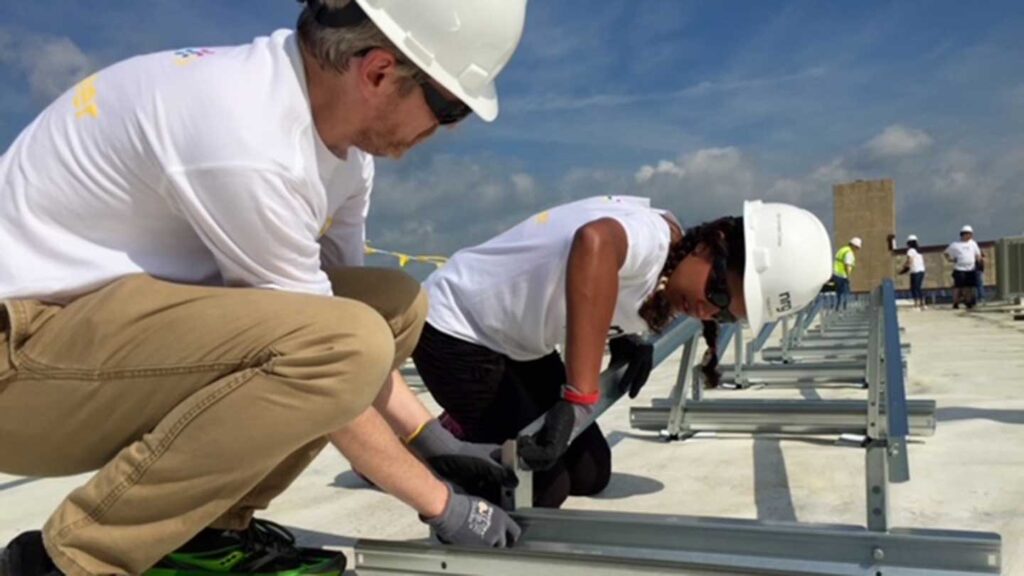'We have an opportunity to imagine a new way in our systems and how we approach everything from food, to housing, to education so we can create new systems that are just and equitable'
By Stella Katsipoutis-Varkanis

Trustee Tanuja Dehne ’93
“I just want to share something upfront,” says Tanuja Majumdar Dehne ’93 as she sits down to be interviewed about her family and career trajectory. “I have a strong support system. I couldn’t have done it alone.”
It’s this sense of community—the belief that it takes a village to lift up others and support them on their path to greatness—that the Lafayette trustee lives and breathes throughout every facet of her life, both personal and professional.
Professionally, Dehne serves full time as the president and CEO of the Geraldine R. Dodge Foundation in Morristown, N.J.—a philanthropic organization that has distributed more than $500 million in grants and technical support to local nonprofits over the last 47 years, with a focus on the arts, education, the environment, and local journalism and poetry.
There, she is spearheading “Imagine a New Way,” the foundation’s transformation toward becoming an antiracist organization, centering its work on racial equity and justice while designing a new model of philanthropy that democratizes power, redistributes wealth, and shifts economic control to communities in ways that are just and regenerative for both people and the planet.
“We’ve all, as individuals and a society, learned so much from the COVID-19 pandemic and the disparities that have been revealed. There is no going back to the way things were,” says Dehne. “We have an opportunity to imagine a new way in our systems and how we approach everything from food, to housing, to education so we can create new systems that are just and equitable. At the Dodge Foundation, we’re joining movements that address root cause and repair of structural racism, and we’re leveraging our power and influence to amplify the voices of individuals, organizers, leaders, and communities closest to the harms of inequities.”
What she finds most rewarding about her job, Dehne explains, is that she wakes up each morning feeling that she is making a difference in the world—one small step at a time.
“It took a long time for me to find my purpose,” she says. “In my first job as a corporate attorney in Philadelphia, I had the opportunity to volunteer as a pro bono lawyer, which allowed me to use my legal skills to make a positive impact for individuals and nonprofit organizations. From there, I expanded my volunteer work and had essentially two parallel career tracks: one in the nonprofit sector and the other in corporate. A pivotal moment in my life was when I made the decision to step away from the corporate career track based on my values and purpose. While terrifying, this decision provided clarity on how I was going to live my life from then on.”

Dehne installed solar panels on the roof of HomeFront’s Family Campus in Ewing, N.J., with NRG Energy
Dehne—who has been magnetically drawn to serving her community since the days she spent as a child in Girl Scouts, as a high schooler writing letters for Amnesty International, and as a Lafayette College student volunteering as a tutor at a local prison—now uses her expertise in law, governance, and building 501(c)(3) organizations from the ground up to provide guidance and support to various not-for-profits.
“As my family was growing, it was important to me that I spent my time, energy, and resources on what made my heart sing, so I made some big decisions to focus my life on what mattered to me personally—people, humanity, and our planet.”
Today, in her spare time, she serves on the boards of trustees for Lafayette College (where she helps support initiatives like alumni development, the Climate Action Plan, and the presidential search), New York Public Radio, and New Jersey Pandemic Relief Fund. Dehne is also a member of the boards of publicly traded Granite Point Mortgage Trust Inc. and Climate Real Impact Solutions Acquisition Corp. II. She also serves as the co-chair of the advisory board of Drexel University’s Gupta Governance Institute.
And as a certified yoga instructor who meditates daily, Dehne prioritizes self-care not only for herself, but also for her team members. In fact, she starts each of her staff meetings with gentle movement and breath work, and ends it with a moment of Zen.
“The pandemic has demonstrated that we must make self-care a priority,” she says. “Each of us has experienced the pandemic differently, and many have lost so much. Therefore, we offer more space and time for grief, silence, and joy. If we don’t care for ourselves, we cannot care for our communities.
“One of the bright spots of the crisis was the unprecedented level of collaboration, connectivity, and co-funding in philanthropy. We can’t tackle the crisis on our own, so we worked together, broke down silos and personal agendas, simplified matters, and focused on community-based solutions. At the Dodge Foundation, we are leveraging those lessons learned as we sharpen on our focus on root cause and repair of structural racism. No one organization can transform and repair systems of inequity, but together we might have a chance.”
The most crucial part of her work, however, Dehne says, is modeling a purpose-driven life for her children

Dehne with her husband, Phillip Dehne ’93, and their five children. Photo by kapuPatel Photography.
“Everything I do is for them,” she explains. “They are young, and they are watching and experiencing what’s going on in this world. My husband, Phillip Dehne ’93, and I are trying to raise our children to be engaged citizens, volunteers, and productive members of society. In order for them to really understand what that means, it is important that we model what that can look like, and that they know that we all have gifts to share—from our time, to our talent, to our treasure. Each day we must ask ourselves: ‘How will we share our gifts today?’”




